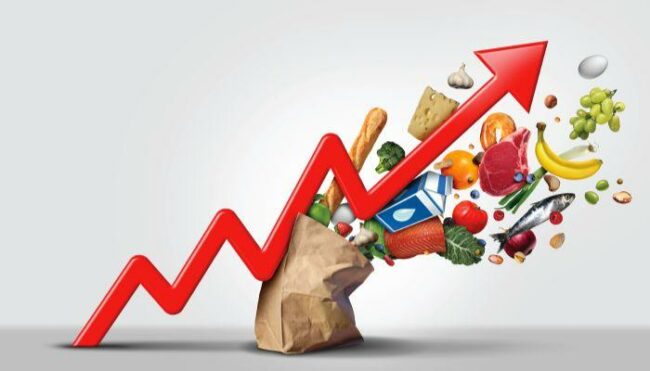By Bayonle Fesobi
The rate at which the cost of foodstuffs has increased in Nigeria has grown to become a scary reality. Many average-income earners can barely afford three square meals. According to the World Food Programme Report 2025, the situation was aptly described as a critical warning that hunger levels now reach alarming new heights across the country, noting that never before have there been so many people in Nigeria without food. As of March 2025, the National Bureau of Statistics reported that the inflation rate in Nigeria has gone up to 24.23% and the annual food inflation rate has reached 21.79% year on year and with a month-on-month inflation increase of 2.18%, up by 0.50% from February 2025.
This severe food inflation crisis as reflected in the surge in food prices is driven by a myriad of factors including economic reforms such as the removal of fuel subsidy, currency devaluation and fundamentally, challenges in agricultural production. The 4% increase in energy cost and 9% depreciation of the Naira has made the cost of transportation and common staples like gari, ofada rice, potatoes and plantain flour to increase.
The economic challenges this has brought on Nigerians have had an adverse effect on the cost of living, forcing so many Nigerians into poverty and food insecurity. With a lot of interventions from government and private individuals, the drive to alleviate the burden and cushion the effects of this economic crisis, the challenge still lingers and the consequences bite hard. For instance, we have had the establishment of private markets to offer food items at subsidised rates in order to make essential commodities more affordable and accessible to the average consumer. There is the Inspire Lagos Food Market where food options are made available to residents of Shomolu and its environs, with its second outreach in four months offering a 50% subsidy on essential food items. The market operates by sourcing food from registered bulk vendors who sell at standard market prices and then offsets 50% of the cost by using the subsidy funds provided by its donors and sponsors. The laudable model with the aim of making food affordable is in partnership with the Shomolu Local Government Area, ensuring that vendors do not suffer loss and helping consumers benefit from significantly reduced food prices.
Whether you are involved in the bustles of the street, the hustles of the non-skilled labour market or the quiet lobby of the corporate world, the cost of foodstuffs in the market is an equator. Addressing food insecurity in Nigeria and how food inflation requires a multifaceted approach, Ominira Initiative produced a video documentary, Daily Bread, about the struggles of an average Nigerian entrepreneur from the lens of a baker and an Agritech entrepreneur.
Exploring the escalating food inflation crisis, their experiences shed more light on how the systemic challenges within Nigeria’s food production and distribution sectors places pressure on the food producers. For the baker, rising operational costs and import duties on essential baking materials such as flour and sugar have significantly impacted the production of bread and placed financial burdens on the business, threatening the sustainability of the small-scale food business, reducing its profits and making expansion difficult. On the other hand, the Agrictech entrepreneur shared how the implementation of technological solutions within the agriculture sector has been a herculean task. Citing inadequate infrastructure and limited access to funding a huge roadblock against the scalability of innovative farming practices. Accordingly, the 12-minute video provides an in-depth analysis of the challenges faced by food producers in Nigeria who are thriving despite the country’s challenging business environment. Representing millions of business owners and entrepreneurs, their stories highlight the difficulty of doing business and the fact that Nigerians now struggle to put food on the table. While we dream of prosperity and wealth, we have to survive each day and get enough strength to face the inevitable issues of life.
As part of the recommendations of the documentary, reducing import duties on essential food production materials, investing in infrastructure and providing financial support for agribusiness to boost efficiency and productivity in the sector will be helpful. Guaranteeing human security along the supply chain within the agricultural sector too will naturally bring down the cost of locally produced food items. Community-based solutions in the form of cooperatives (financial, infrastructural and security) can also improve food distribution and affordability.
As insecurity in the North-West and North East parts of the country continues to reduce farming activities; high cost of transportation due to subsidy removal and Naira devaluation; sky rocketing costs of agricultural products such as fertilizer and seeds and inconsistencies created by market monopolies and middle men, it is no surprise that a typical household of four spends over 60% of income on food as a bag of rice is now between #80,000 – #90,000 compared to 25,000 in 2020; tomatoes, onions, yam, garri have all witnessed a tripled increment.
As Nigerians live through these challenges day in day out, it is important to remind all relevant stakeholders to collaborate in developing sustainable solutions that address both the immediate and long-term food security in Nigeria.
- Bayonle Fesobi is a free trade enthusiast and works as the Research and Policy Analyst at Ominira Initiative for Economic Advancement.








